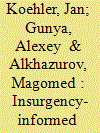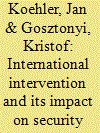|
|
|
Sort Order |
|
|
|
Items / Page
|
|
|
|
|
|
|
| Srl | Item |
| 1 |
ID:
144772


|
|
|
|
|
| Summary/Abstract |
In this article we analyse the dynamics of the insurgencies and the corresponding counter-insurgency measures in the North Caucasus over the past 25 years. By comparing three cases – Chechnya, Dagestan, and Kabardino-Balkaria – we identify similarities and differences in the way insurgencies and counter-insurgency measures influence governance in the region. Analysing different dynamics and outcomes under similar framework conditions – a federal state with a centralised government trying to govern a region with a shared history of rebellions against central rule and with similar geographic, social, and cultural features facilitating resistance and insurgencies – is a promising approach to better understanding conditions and implications of insurgency-induced governance in post-Soviet Russia.
|
|
|
|
|
|
|
|
|
|
|
|
|
|
|
|
| 2 |
ID:
133140


|
|
|
|
|
| Publication |
2014.
|
| Summary/Abstract |
The challenge of building a security sector effective in terms of protecting the population and the state from challengers, and which at the same time fulfils minimum standards of good governance, was a daunting one in Afghanistan. These difficulties were compounded by what in hindsight seem to be obvious mistakes on the part of the intervention. In our paper, we investigate how security sector building fared under such adverse conditions in north-east Afghanistan. We find that in spite of the formidable challenges and the mistakes made by the international intervention, it did not fail completely. Neither did it succeed. Based on the results of quantitative surveys and qualitative research, we suggest that (a) the international intervention was partly successful in building up Afghan National Security Forces - both as a fighting force and in terms of security sector institutions that are restrained to some extent by the rule of law; (b) the problems caused by setting up informal local militias (violent feuds, criminality, human rights abuses and extortion of the population) could be partly mitigated by transforming them into an official local police programme.
|
|
|
|
|
|
|
|
|
|
|
|
|
|
|
|
| 3 |
ID:
077180


|
|
|
|
|
| Publication |
2007.
|
| Summary/Abstract |
This essay explores the interdependence between statebuilding, narcotics and conflict through an analysis of interviews and a survey conducted, in the spring of 2005, in the Laghman and Nangarhar provinces of Afghanistan. Rural Afghanistan is characterized by weak conflict-processing mechanisms, combined with a high propensity towards the escalation of violence. State-sponsored institutions for conflict processing hardly exist, and donor attempts to prop up traditional institutions, such as the village shura, as a substitute for local government have failed to produce tangible results. Farmers widely acknowledge the benefits of opium as one of the few available cash crops. As a result, competition over scarce land and propensity for violence are affected indirectly by the drug economy. The study concludes with a criticism of current poppy eradication efforts. Under an informal 'eradication contract', provincial leaders are induced to comply with the request of the central government to reduce opium cultivation, in exchange for increased political autonomy and the promise of donor funds.
|
|
|
|
|
|
|
|
|
|
|
|
|
|
|
|
|
|
|
|
|